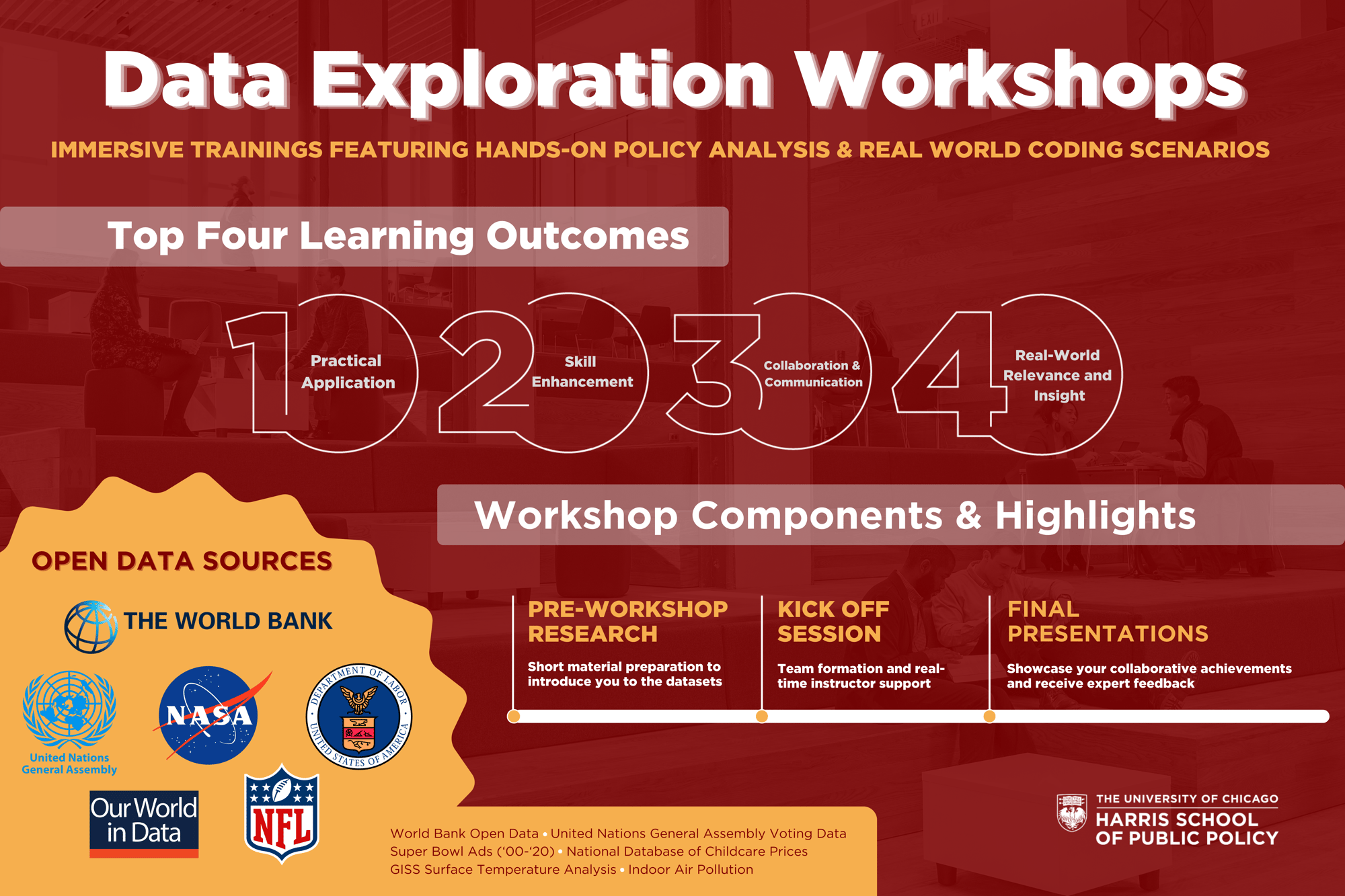Diving into a dataset and navigating the entire data analysis process can be a daunting task, particularly for newcomers to this field. The Policy Analytics Credential Program is designed by UChicago faculty and our experienced instructors who serve as Teaching Fellows for UChicago master-level students. It starts at the beginner-friendly foundational level and equips you with a practical skillset in policy analysis using the UChicago approach within 9 weeks.

|
|
Foundations of Programming in R, Foundations of Statistics, Policy Applications |
|
|
Beginner |
|
|
Nine (9) weeks, 5-8 hours per week |
|
|
March 31 - May 30, 2025 |
|
|
$1,500 with a range of discount options available |
|
|
Virtual Online |
The Policy Analytics Credential Program is a unique dynamic learning experience designed jointly by UChicago faculty, students, and alumni to equip individuals who aspire to dive into critical policy issues with robust data analytics skills. Led by the vibrant Harris School of Public Policy community members, the program presents an open and inviting learning experience with a group of UChicago MPP alumni who excel in coding and are enthusiastic about empowering more learners to bridge data skills with policy practice.
With pre-recorded lectures offering flexibility and synchronous weekly office hours for interactive learning, participants can tailor their study schedules to fit their needs. Participants can also attend Policy Insights & Data Exploration Workshops led by UChicago instructors, gaining insights into groundbreaking research with real-world impact. These sessions also act as relevant check-in points where theoretical knowledge meets hands-on coding, emphasizing real-world data analytics challenges. An exceptional opportunity for students to solidify their coding and statistical knowledge through practice.
This course is designed to lay a strong foundation for studying data analysis using the powerful statistical modeling software, R. It will familiarize participants with essential aspects of R, including data manipulation, causal inference techniques, data visualization, and more. The aim is to empower participants to apply R effectively in their future professional endeavors or graduate studies. The course begins with the fundamentals, making it an ideal choice for those new to the field.
Participants are provided with an understanding of the concepts of statistical inference and a familiarity with the methods of applied statistical analysis. It exposes participants to fundamental statistical principles, such as probability, descriptive and inferential statistics, correlation, regression, and more. Ultimately, participants will develop the capability to interpret data from a scientific perspective and apply these methods effectively in real-world scenarios.
Embarking on a dataset and navigating the entire data analysis process can be a daunting task, particularly for newcomers to this field. However, our workshop is thoughtfully structured to guide participants through this journey, with the dedicated support of Harris experienced graduate instructors.
Our team of graduate instructors brings a wealth of knowledge and practical experience to our program. They are not only experienced educators but also young professionals with years of practical experience using R in their workplaces.
Throughout the workshop, participants will have the opportunity to gain valuable insights into how these experts utilize data to create meaningful policy impact, both in academia and in various professional settings. This hands-on experience enables participants to actively engage with real-world policy challenges that our instructors have addressed. These interactive and enlightening sessions offer participants a fresh perspective on data analysis and its pivotal role in shaping public policy, all within the distinctive framework of the University of Chicago.
Furthermore, participants will have the opportunity to collaborate with their peers, fostering discussions on techniques and key considerations for effective data analysis. During these live workshops, graduate instructors will also share their approaches to handling datasets and coding efficiently.
| Week 1 | Week 2 | Week 3 | Week 4 | Week 5 | Week 6 | Week 7 | Week 8 | Week 9 | |
|
Programming in R |
Introduction to Programming in R |
Data Transformation in R Part 1 |
Data Transformation in R Part 2 | Data Visualization | R Programming Concepts | ||||
|
Statistics |
Introduction to Statistics |
Foundations of Statistics |
Descriptive and Inferential Statistics |
Correlation and Regression |
Casual Inference, Experiments, Grand Finale Coding |
||||
|
Data Exploration & Policy Insights Workshops |
Workshop 1 | Workshop 2 | Workshop 3 | Workshop 4 | Workshop 5 | Workshop 6 |



Instructor Profile
Arthur Cheib is the Executive Director of CEPIS (Centro de Políticas Públicas e Imersão Social) in Brazil, where he oversees data consulting for government projects, leads public policy research, and develops tailored graduate programs. Previously, Arthur was a Consultant at the World Bank, specializing in data analysis and coordinating cross-country projects within the Education Global Practice.
Arthur’s career in public policy began in Brazil, where he served as a Public Policy Specialist and Data Scientist for the Departments of Education in Minas Gerais and São Paulo states. Pursuing a Master of Public Policy at the University of Chicago (2021-23), he expanded his expertise to include Regional Economic Development, subject he previously explored as Director of Research at a prominent Brazilian NGO.
Arthur has also instructed courses at the University of Chicago’s Harris School of Public Policy, including PPHA 30110 - Coding Lab for Public Policy, and served as Head Teaching Assistant across various graduate courses.

Instructor Profile
Jose M. Macias is an Associate Data Fellow in the Futures Lab within the International Security Program at the Center for Strategic and International Studies. While pursuing his Masters in Public Policy (MPP) degree at the University of Chicago's Harris School of Public Policy, he was also a Pearson Fellow and teaching assistant for multiple courses. With a keen interest in the quantitative study of war, Jose’s research delves into topics like cross-domain conflicts, societal impacts, and the integration of machine learning in International Relations research, with prior significant contributions to The Correlates of War Project including notable work quantifying the effects of U.S. bilateral counterterrorism treaties in the global south and eastern Europe. He also previously held positions as a cyber strategy intern at the U.S. Department of Defense and Army Cyber Command, working to expand the Dyadic Cyber Conflict Dataset (v 2.0), as well as a fellow with the Congressional Hispanic Caucus Institute (CHCI), serving under U.S. Senator Angus S. King. Jose graduated from the University of Chicago's Harris School of Public Policy with his MPP degree in 2024, with a special focus on data analytics. His academic journey as a first-generation includes securing an AA in Political Science from Fullerton College and a dual BA in Political Science and International Relations from the University of California, Davis.
March 31 - May 30, 2025
Participants expect to spend about 5-8 hours per week including watching lecture recordings, working on assignments and projects, and joining interactive office hours and workshops.
Asynchronous (pre-recorded) lectures from instructors.
Optional live teaching sessions and office hours with instructors & teaching assistants.
Optional synchronous workshops with Harris instructors.
Issued by Harris to showcase your academic rigor.
The program fee is $1,500. We offer partial discounts to early action applicants, UChicago community members and group-registered applicants. In addition, we support applicants to explore funding sources from your academic institution, employer, or external scholarships.
|
Audience |
Fee |
|
General |
$1,500 |
|
Early Action Applicant |
$1,200 |
|
Current UChicago students, staff or alumni |
$900 |
|
Incoming Harris degree students |
$800 |
|
Organizational Sponsorship for 3+ Applicants: |
Contact us at harriscredential@uchicago.edu to discuss group rates |
|
If enrolling in two or more credential programs during the same cycle |
Receive an additional 20% discount on the program fees (After the initial discounts and scholarships) |
Once being admitted, participants will secure the seat by submitting a $500 USD enrollment deposit, which is non-refundable and applies toward your total program fee. The remaining program fee balance will be paid before the program starts. Detailed payment instructions will be provided to admitted participants via email.
Starting in April 2025, the application for admission to the Policy Analytics Credential will include a supplemental essay prompt for applicants who wish to be considered for the Community Impact Scholarship. Essays will be evaluated by the Harris Credential Programs admissions committee. Applicants who are admitted and demonstrate eligibility for the Community Impact Scholarship will receive the award, which will be granted at the time of admission.
|
|
Application Deadline |
Notification |
Reply Deadline |
|
Early Action |
November 12, 2024 |
Late November |
December 9, 2024 |
|
Round 1 |
January 14, 2025 |
Late January |
February 10, 2025 |
|
Round 2 |
February 11, 2025 |
Late February |
March 10, 2025 |
|
Round 3 |
March 11, 2025 |
Mid March |
March 23, 2025 |
If the participant decides to cancel their Program enrollment, the participant must submit a request in writing at least 30 days prior to the program start date to harriscredential@uchicago.edu to receive the paid amount less the non-refundable enrollment deposit. Requests received 14 to 30 days before the Program start date are subject to a payment of 50% of the Program fee. Requests received within 14 days of the Program start date are subject to full payment of the Program fee. If the participant is unable to join the Program due to circumstances that the participant has no control or influence over, the refund amount will be considered on an individual case-by-case basis.
Absolutely! The PAC is specifically structured to provide an accessible entry point for individuals interested in delving into the realms of programming, statistics, and public policy. It welcomes participants from diverse academic and professional backgrounds, including working professionals, recent graduates, and current students. The course’s manageable weekly commitment of 5-8 hours makes it an ideal launching pad for those looking to embark on a journey into data analysis within the context of public policy.
Designed by UChicago faculty and graduate instructors, PAC is tailored for individuals who are newcomers to programming, statistics, and public policy. The curriculum begins at the foundational level, making it an ideal option for beginners with no prior experience in statistics or R Programming. It requires a manageable 5-8 hours per week. Throughout the program, you will have ample opportunities to interact with UChicago PhD students, graduate instructors, and staff members, allowing you to actively participate in the thriving UChicago R user community.
Yes! We encourage participants who have no prior experience in coding or statistics to take PAC as a self-paced first-step program. You will have access to all the live teaching sessions and have nine weeks to help you ramp up the learning curve. We understand our participants all have other work or study obligations; therefore PAC is great to add just a few hours to your weekly schedule while maximizing your exposure and readiness for more advanced programs such as the Data and Policy Summer Scholar Program (DPSS) or the Policy Research and Innovation Bootcamp (PRIB)
There are no scholarships provided for the PAC program participants. If you apply for the program by the Early Action round, you will be eligible for the discounted program fee. For more financial tips, please read the blog "Financial Planning for Credential Programs".
Please feel free to reach out to us at harriscredential@uchicago.edu.
You can also book a 20-minute online appointment with the admissions team to talk through your questions directly.